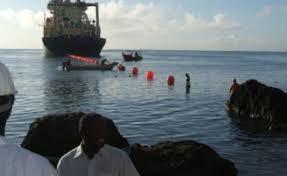Kenya’s third largest mobile phone operator, Telkom Kenya has landed the Djibouti Africa Regional Express 1 (DARE 1) submarine cable in Kenya’s port city of Mombasa.
The 5,400-kilometer cable system dubbed the Djibouti Africa Regional Express-1 (DARE1) will link Djibouti, Mogadishu, Mombasa and Bosaso, and will deliver a capacity of up to 30 terabits per second.
The DARE 1 cable will now offer a strategic alternative in the routing of traffic as well as the handling of increased capacity to East Africa.
DARE1 is the dedicated work of a consortium consisting of Telkom Kenya, Somtel – a private Telecoms operator in Somalia, and Djibouti Telecom, to boost connectivity and data access in the region, with eventual gains being realised for the end consumer.
“A decade after the landing of the first sub-marine cable in Kenya, DARE 1 not only brings a unique investment opportunity to the country but unrivalled redundant international connection on newer technology, as we seek to strengthen our value proposition to our customers. In addition, as a Telco, we play a strategic role in the development of critical infrastructure to support the advancement of Kenya and the region into digital economies,” said Managing Director, Carrier Services Division at Telkom Kenya, Kebaso Mokogi.
The DARE 1 sub-sea cable is a 3-fiber pair, with a capacity of 36TB each.
Kenya has access to both, one an express route from Djibouti to Mombasa city and the second one terminating into Somalia and then Kenya.
The DARE 1 cable now strategically boosts Mombasa’s position as a co-location hub and a key gateway into East Africa, given the ability to move data quickly and cheaply, via a secure connection with other data centers, looking to gain a footprint in the region.
On the other hand, the continued growth in consumer demand for connectivity and data will unlock new markets for Content Development Networks and Over the Top Service Providers to the country.
“We believe that this investment will catalyze the advent of many more cables, especially to businesses looking to commoditize data in Kenya. As technology gets more sophisticated, we are constantly looking at less costly and more efficient alternatives and this is a good example of what cooperation can do,” said the Director of International Business at Djibouti Telecom, Mr. Mohamed Ahmed.
The fast-rising requirements of cloud-based technology businesses and their customers, as well as the search for the smallest possible delays in transaction times (known as latency) has seen businesses seek alternative data options.
The arrival of DARE 1, therefore, becomes part of the critical infrastructure essential to realise these desired efficiencies.
The World Bank posits that for every 10 percent of the population that is connected to broadband, there is a 1.38 percent impact to GDP in developing nations.
The growth in data is now seen as being driven by service providers with the task of infrastructure provision left in the hands of Telcos.
The DARE 1 idea was mooted in 2018, paving way for a year-long planning process to chart the cable route from Djibouti to Kenya.
By March 2019, the process towards the reception of all the requisite territorial and environmental permits was well underway and concluded in October 2019, when cable laying experts, SubCom began the manufacture of the cable.
The process of building and laying of the DARE 1 cable has been ongoing for the past three months before its landing in Mombasa, on Friday.
Telkom Kenya will now take up the task of laying and managing the inland fiber optic cabling to various terrestrial locations across the country.
JK/as/APA


